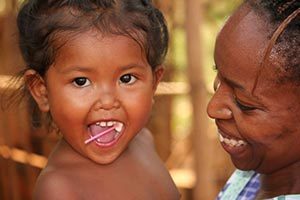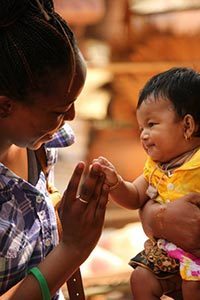Being on the Front Lines Takes a Different Kind of Lawyer

A safe house for children battling AIDS in Lesotho relies solely on donors. How can we help build a sustainable source of income to keep the home solvent?
Amaranth may be the next super food. How can we encourage Guatemalan farmers to grow, consume, and find markets for it in order to improve their nation’s standard of living?
Despite widespread investment in nutrition programs, 40% of Cambodian children are under-developed. Why are these investments not paying off?
These are a few of the projects Notre Dame Law students worked on in the spring semester of 2014. Teams of students studied the problems for months, proposed solutions, and then, in a joint venture with Catholic Relief Services, traveled overseas to meet these problems where they exist..
Welcome to Business on the Frontlines.

“The Business on the Frontlines course stems from the fundamental belief that business is a powerful force for good if it is deployed properly, but that it is exceptionally underutilized in development, particularly in environments where there have been civil wars and conflict,” explains Professor Emily Block of the Mendoza College of Business.
The course began in 2008, and in 2010 was named one of Forbes Magazine’s ten most innovative business classes. Each class is comprised of students from the Mendoza College of Business, NDLS, and the Kroc Institute for Peace Studies. NDLS participation began with JD candidates, but the class is now open to LLM students as well. The course includes a rigorous classroom component as well as a unique field component. In the past three years, the Center for Civil and Human Rights has facilitated the participation of 13 NDLS students, sending them to a variety of countries including Guatemala, Ghana, Lesotho, and Rwanda.
“The Mendoza Business on the Front Lines program is a terrific and innovative course that exemplifies three of our own strengths: it is interdisciplinary, it is international, and it is experiential. Our students love it,” explains Joseph A. Matson Dean of the Law School Nell Newton. “It is one of the many unique opportunities we can offer them by virtue of being a law school located in the heart of a great university.”
Notre Dame Law graduate, Caroline Wambui ’14 LL.M. was accepted into the course this past spring and worked on a project in Cambodia. She found the class valuable for its academic challenge as well as its personal one.
“It is perhaps the best problem-solving experience I have undergone so far in an academic environment. It is practical learning at its best,” states Wambui, who holds a law degree from The University of Pretoria, South Africa. “Questions were asked, worst case scenarios were painted, and I brainstormed with people I had assumed cared mainly about the bottom line. But they asked the tough questions on dignity and scratched beneath the surface in a way that was new to me. I came into this class slightly presumptuous about development issues and critical about business, but I walked away humbled.”
At the outset, the highly selective class was only open to business students; however, the value NDLS students could offer soon became apparent.
“Sometimes projects that we think are going to have a strong legal component may change or the projects that don’t seem to have anything legal initially do see them emerge,” offers Professor Block. “I can guarantee you, however, that at some point, the law student is going to ask a question that none of us would have thought of and that this question is going to be a game changer.”
While in school, all NDLS students are encouraged to participate in a wide variety of clinical programs, externships, lawyering skills courses, immersion and pro bono programs. More information about these offerings is available at our Clinics and Experiential Learning web page.